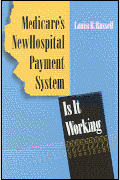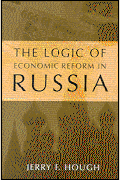This post originally appeared in the Wall Street Journal.
Next month, Bengt Holmstrom, a professor at MIT, is slated to accept a Nobel Prize in Economics for his pathbreaking contributions to contract theory. Congressmen and corporate boards might want to take note: Mr. Holmstrom’s innovative proposal for indexed stock options, which aren’t yet widely used, could be one solution in the running political debate over whether CEOs are fairly paid for performance.
Almost all stock options today have a fixed exercise price: The holder buys the company’s stock at the market price on the day the options were granted. The idea is to align the interests of CEOs and their shareholders. If the stock rises, the executive buys at the old price and makes a profit. On the other hand, if the company’s stock is flat or down, the options become worthless.
Unfortunately, as Mr. Holmstrom pointed out in 1979, fixed-price options can easily reward poorly performing executives during times of rising markets. Suppose a drug company grants 50,000 options to its CEO with an exercise price of $100 a share. If in three years the stock rises by 30%—to $130 a share—the CEO exercising his options would make a profit of $1.5 million.
Sure, sometimes this profit might reflect the outstanding work of this CEO. But suppose the stock prices of comparable drug companies rose by 60% on average during the same three years. Suddenly the CEO’s options look like a windfall instead of a reward for his superior managerial skills.
The opposite can also happen. Suppose the stock of our CEO’s firm fell by 15% a share in three years, when comparable drug companies dropped by 30%. The CEO’s stock options would be worthless, even though he did a much better job than his peers of managing the decline in the industry.
An indexed stock option eliminates these problems by doing away with the fixed exercise price. Instead, the CEO has the option to purchase stock at a price that rises or falls along with the share prices of comparable firms. The board would choose an appropriate industry stock index against which to measure the executive’s performance. For administrative feasibility, the exercise price of the indexed options could be adjusted no more than annually.
To take an example: If the industry index rose 10% by the end of one year, so would the exercise price of the CEO’s options. Meaning that if the stock of the CEO’s firm increased by the same 10% that year, his options wouldn’t gain value. This is the way to avoid over-rewarding (or under-rewarding) executives. CEOs with true managerial skill, those who beat their industry averages, will be richly compensated. Those who don’t, won’t.
So why have almost no companies ever awarded options structured this way? Historically, firms shunned indexed options because the variable-price model would generate expenses on their income statements, while fixed-priced options did not. However, that comparative disadvantage no longer exists: For roughly a decade, companies have also been required to record expenses for fixed-price options.
More important, an indexed stock option is subject to onerous taxes. Regulators wanted to prevent companies from granting options with exercise prices below market—say, a $70 option on stock worth $100—thus giving their executives built-in profits. So there’s a special rule for any option whose exercise price drops below the stock’s market value on the grant date: the government immediately taxes these built-in profits, plus a 20% penalty.
Indexed stock options weren’t the target, but they unfortunately fall under that regulation. To encourage companies to adopt Mr. Holmstrom’s proposal, tax authorities should revise the rule to exempt indexed options.
A last factor is competition. Executives might say that indexed options are less valuable than fixed-price ones, especially in rising markets. But there are other ways to bid for top CEO talent. Companies could grant them restricted shares, whose payoff depends on achieving specified revenue or earnings targets.
In short, indexed options are designed to reward managerial skill instead of fortuitous movements of the stock market. The government should change the tax rules so that a performance-oriented company may choose to award them without penalty. It’s a good idea—and you don’t have to take my word for it: Ask the Nobelist.
Pozen has been a nonresident senior fellow at Brookings since 2010. In 2015, he generously committed to endow the Director’s Chair for the Urban-Brookings Tax Policy Center. Until 2010, Pozen was executive chairman of MFS Investment Management and, before 2002, served in various positions at Fidelity Investments. He did not receive financial support from any firm or person for this article or from any firm or person with a financial or political interest in this article. He is currently not an officer, director, or board member of any organization with an interest in this article.
The Brookings Institution is committed to quality, independence, and impact.
We are supported by a diverse array of funders. In line with our values and policies, each Brookings publication represents the sole views of its author(s).









Commentary
Op-edA Nobel idea to pay CEOs what they’re actually worth
November 15, 2016